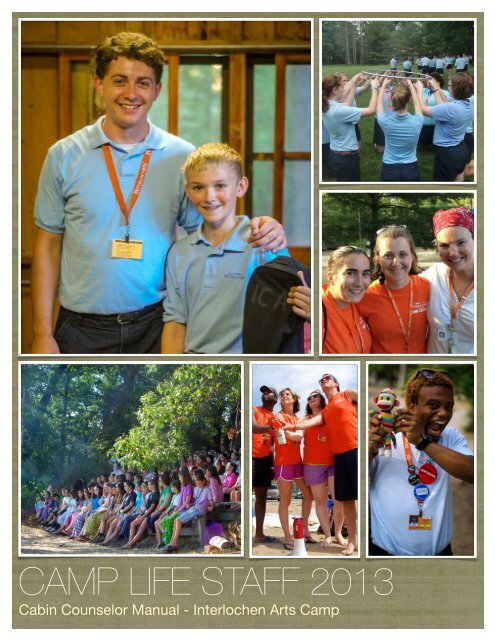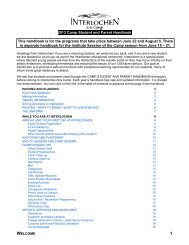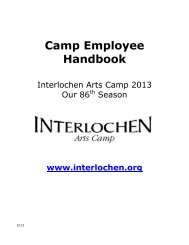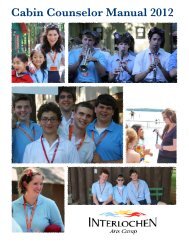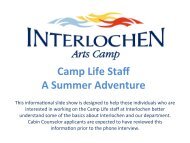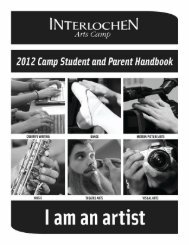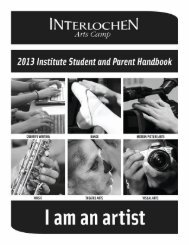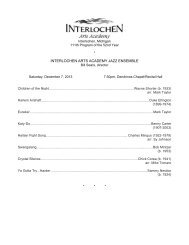Cabin Counselor Manual 2013 Final - Interlochen Center for the Arts
Cabin Counselor Manual 2013 Final - Interlochen Center for the Arts
Cabin Counselor Manual 2013 Final - Interlochen Center for the Arts
Create successful ePaper yourself
Turn your PDF publications into a flip-book with our unique Google optimized e-Paper software.
CAMP LIFE STAFF <strong>2013</strong><br />
<strong>Cabin</strong> <strong>Counselor</strong> <strong>Manual</strong> - <strong>Interlochen</strong> <strong>Arts</strong> Camp<br />
!
<strong>Interlochen</strong> <strong>Arts</strong> Camp<br />
<strong>Cabin</strong> <strong>Counselor</strong> <strong>Manual</strong><br />
<strong>2013</strong><br />
Table of Contents<br />
<strong>Interlochen</strong> <strong>Center</strong> <strong>for</strong> <strong>the</strong> <strong>Arts</strong> ................................................................................................................................. 3<br />
Statement of Philosophy<br />
History of <strong>Interlochen</strong><br />
Philosophy of Founder - Dr. Joseph E. Maddy<br />
Camp Life Personnel ................................................................................................................................................ 4<br />
Divisional Structure<br />
Administrative Structure<br />
O<strong>the</strong>r Key People<br />
Camp Life General In<strong>for</strong>mation ................................................................................................................................ 6<br />
Camp Life Mission<br />
Staff Training<br />
Student Handbook<br />
General Behavior<br />
Personal Grooming<br />
Alcohol Policy<br />
Illegal Substances<br />
Smoking Policy<br />
Confidentiality<br />
Time Off<br />
Appliances<br />
Fire Safety<br />
Cell Phone and Computer Use (staff)<br />
Health Care<br />
Laundry<br />
Visitors<br />
Mail<br />
Participation in Lessons/Ensembles<br />
Pets<br />
Practicing<br />
Worship Services<br />
Vehicle/Parking Policy<br />
Division Guidelines and Policies .............................................................................................................................. 8<br />
Division Coverage<br />
Division Duties<br />
Roving<br />
Evening Accounting <strong>for</strong> Campers<br />
Outings<br />
Recreation<br />
Waterfront<br />
Understanding Your Role ......................................................................................................................................... 9<br />
Defining <strong>the</strong> Role of <strong>the</strong> <strong>Cabin</strong> <strong>Counselor</strong><br />
Defining <strong>the</strong> Style of <strong>the</strong> <strong>Cabin</strong> <strong>Counselor</strong><br />
The Ideal <strong>Cabin</strong> <strong>Counselor</strong><br />
1
Understanding Your Campers .................................................................................................................................. 11<br />
The 8 Year Old<br />
The 9 Year Old<br />
The 10 Year Old<br />
The 11 Year Old<br />
The 12-14 Year Old<br />
The 15-16 Year Old<br />
The 17-18 Year Old<br />
Taking Care of Campers .......................................................................................................................................... 14<br />
Behavior Management Policy<br />
Definitions<br />
Discipline vs. Punishment<br />
Teaching Appropriate Behavior<br />
Positive Rein<strong>for</strong>cement through Effective Praise<br />
Corrective Teaching<br />
Assist Campers in Regaining What Has Been Lost<br />
Psychological and Emotional Health ........................................................................................................................ 18<br />
Caring and Helping: What Can Be Done<br />
Camper Psychological and Emotional Concern Protocol<br />
Communication ........................................................................................................................................................ 19<br />
Para-verbal Communication<br />
Basic Principles of Good Communication with Children<br />
Basic Principles of Good Communication with Parents<br />
Emergencies and First Aid ....................................................................................................................................... 21<br />
Calling For Help<br />
Emergency Response<br />
Emergency Procedures Check List<br />
Lightening Safety<br />
First Aid Response<br />
Lockdown<br />
Fire<br />
Lost Swimmer Procedure<br />
Swimmer’s Itch<br />
<strong>Counselor</strong>’s List of What to Bring ............................................................................................................................. 23<br />
2
<strong>Interlochen</strong> <strong>Center</strong> <strong>for</strong> <strong>the</strong> <strong>Arts</strong><br />
STATEMENT OF PHILOSOPHY<br />
<strong>Interlochen</strong>’s major education programs nurture students through an arts intensive curriculum practiced within a<br />
framework of healthy competition and intensive curriculum practiced within a framework of healthy competition and<br />
public presentation. Under <strong>the</strong> guidance of an exemplary faculty of artists and educators, <strong>Interlochen</strong> provides an<br />
environment in which students may achieve <strong>the</strong> highest possible artistic, academic, intellectual and ethical standards<br />
as individuals and as responsible members of a diverse society.<br />
<strong>Interlochen</strong> through its major outreach programs, express its high goals and standards to <strong>the</strong> community and offer<br />
students, faculty, and staff opportunities <strong>for</strong> frequent public presentation in a structured and supportive environment.<br />
Patrons and listeners are provided a broad range of high-quality programs that are enriching, stimulating,<br />
entertaining and worthy of support.<br />
Approved by <strong>the</strong> Board of Trustees<br />
July 25, 1998, Amended October 14, 2000<br />
HISTORY OF INTERLOCHEN<br />
In 1928, Dr. Joseph E. Maddy’s dream of a permanent training ground <strong>for</strong> young artists was realized in <strong>the</strong> <strong>for</strong>mation<br />
of <strong>the</strong> National High School Orchestra Camp at <strong>Interlochen</strong>. Today, <strong>the</strong> <strong>Interlochen</strong> <strong>Center</strong> <strong>for</strong> <strong>the</strong> <strong>Arts</strong> continues as<br />
<strong>the</strong> country’s premier site <strong>for</strong> young musicians, dancers, actors, visual artists, writers and motion picture artists.<br />
The <strong>Interlochen</strong> <strong>Center</strong> <strong>for</strong> <strong>the</strong> <strong>Arts</strong> is composed of <strong>the</strong> <strong>Interlochen</strong> <strong>Arts</strong> Camp, <strong>the</strong> <strong>Interlochen</strong> <strong>Arts</strong> Academy —<br />
which, founded in 1964, has <strong>the</strong> distinction of providing more Presidential Scholars in <strong>the</strong> <strong>Arts</strong> than any o<strong>the</strong>r high<br />
school in <strong>the</strong> United States — <strong>Interlochen</strong> Public Radio, one of <strong>the</strong> best subscribed public radio stations in <strong>the</strong><br />
country, <strong>Interlochen</strong> Presents which presents more than 750 concerts and exhibits a year, and <strong>the</strong> <strong>Interlochen</strong><br />
College of Creative <strong>Arts</strong>.<br />
<strong>Interlochen</strong>’s alumni comprise more than 10% of <strong>the</strong> members of <strong>the</strong> nation’s major symphony orchestras. Among<br />
<strong>the</strong> 80,000 alumni are actors Meredith Baxter, Richard Brooks, Linda Hunt, Bruno Campos; dancers Peter Sparling<br />
and Janet Eilber; musicians Peter Yarrow, Jesseye Norman, Peter Erskine, Lorin Maazel, Nora Jones, Josh Groban<br />
and Jewel; writers Pamela White Hadas and Cathy Guisewite; broadcaster Mike Wallace and visual artists Wendy<br />
Midener and Keane Paradiso.<br />
PHILOSOPHY OF FOUNDER - DR. JOSEPH E. MADDY<br />
“’To leave <strong>the</strong> world a little better <strong>for</strong> having lived in it,’ is <strong>the</strong> motto of <strong>the</strong> National High School Orchestra; to develop<br />
character and leadership through music is <strong>the</strong> aim of <strong>the</strong> camp.” - 1929<br />
“… <strong>the</strong>re should be some haven of peace and joy where selfishness surrenders to universal kindness and<br />
cooperative enterprise, where beauty conquers worldly ills. Let us make <strong>Interlochen</strong> that place, <strong>for</strong>getting our<br />
worries...drinking in <strong>the</strong> beauties of nature and music, and living our ideals.” - 1934<br />
“…(<strong>Interlochen</strong>), established <strong>for</strong> <strong>the</strong> purpose of testing and developing talent (in <strong>the</strong> arts) provides an ideal<br />
environment wherein <strong>the</strong> arts becomes <strong>the</strong> principal <strong>the</strong>me in a life situation created to stimulate artistic endeavor<br />
and growth in personality. Mild competition in every camp activity, unsurpassed opportunities <strong>for</strong> talent-finding and<br />
talent-testing, association with hundreds of o<strong>the</strong>r talented and ambitious students from all parts of <strong>the</strong> country, and<br />
daily contact with leaders of outstanding attainments, combine to stimulate artistic progress. Growth in citizenship<br />
and personality accrues from wholesome living with youth of high aspirations and in close association with nature.” -<br />
1946<br />
3
Camp Life Personnel<br />
Divisional Structure<br />
Each division is structured <strong>the</strong> same way; however, <strong>the</strong> number of youth development professionals in each position<br />
varies.<br />
<strong>Cabin</strong> <strong>Counselor</strong>s<br />
<strong>Counselor</strong>s live in cabins with <strong>the</strong> campers, supervise <strong>the</strong>ir everyday activities, deal with <strong>the</strong>ir problems, and become<br />
involved in <strong>the</strong>ir lives and ambitions. <strong>Counselor</strong>s are responsible <strong>for</strong> <strong>the</strong> physical, emotional and overall well-being of<br />
<strong>the</strong>ir campers. In addition, counselors instruct students in various areas of recreation; land sports, water sports and<br />
camp crafts, as well as supervise groups of campers at concerts, plays and various social events.<br />
Lifeguards<br />
Lifeguards are staff members certified in Lifeguard Training (LT) or as Water Safety Instructors (WSI). They<br />
guard swimming and canoeing <strong>for</strong> all divisions as well as guarding at off-campus beach trips. Lifeguards’<br />
primary role is first as a cabin counselor in <strong>the</strong> division and secondarily at <strong>the</strong> waterfront.<br />
Unit Leaders<br />
Each Unit Leader is responsible <strong>for</strong> <strong>the</strong> cabins and <strong>the</strong> counselors in <strong>the</strong>ir unit including oversight of daily<br />
inspections, and various divisional duties. Unit Leaders have contact with <strong>the</strong>ir counselors several times a day, at<br />
headcount at night, during inspections, and serve as a first source of assistance to counselors in resolving issues.<br />
Waterfront Director<br />
The Waterfront Director must hold a current ARC certification in Lifeguard Training. S/he is also responsible <strong>for</strong><br />
overseeing <strong>the</strong> divisional waterfront. This includes guarding and teaching, as well as supervising off-campus<br />
recreational excursions. The Waterfront Director also provides administrative coverage in <strong>the</strong> division.<br />
Recreation Director<br />
The Recreation Director plans and organizes all recreational activities and co-recs, oversees <strong>the</strong> running of <strong>the</strong> Rec<br />
hut, and coordinates recreational classes, tournaments and special activities. The Recreation Director also provides<br />
administrative coverage in <strong>the</strong> division.<br />
Assistant Director(s)<br />
Assistant Director(s) live in headquarters or <strong>the</strong>ir own cabin and are responsible <strong>for</strong> organizing and supervising<br />
counselor schedules and <strong>for</strong> aiding unit leaders and cabin counselors. They adjudicate camper infractions and work<br />
with <strong>the</strong> director in coordinating divisional activities, duties, and policies. They work with unit leaders and<br />
administrative staff to solve concerns throughout <strong>the</strong> division. Assistant Directors act as <strong>the</strong> director in his/her<br />
absence and assist with counselor evaluations.<br />
Director<br />
The Director is responsible <strong>for</strong> coordinating <strong>the</strong> activities and policies of <strong>the</strong> division. S/he serves as a liaison<br />
between <strong>the</strong> division and <strong>the</strong> Camp administration. The Director is <strong>the</strong> primary contact in addressing issues involving<br />
parents and camper-parent problems. S/he serves as a guiding <strong>for</strong>ce, a final authority and a model <strong>for</strong> campers.<br />
The Director works closely with divisional staff and completes counselor evaluations.<br />
Administrative Structure – These positions all serve <strong>Interlochen</strong> on a year-round basis.<br />
President - Jeff Kimpton<br />
The president serves as <strong>the</strong> chief operating officer of all 5 facets of <strong>Interlochen</strong> <strong>Center</strong> <strong>for</strong> <strong>the</strong> <strong>Arts</strong>.<br />
Vice President, Education Programs – Ted Farraday<br />
The Vice President oversees <strong>the</strong> artistic and academic program of <strong>the</strong> Academy and Camp.<br />
Vice President, Student Affairs - Tim Wade<br />
The Vice President oversees <strong>the</strong> out-of-classroom activities and services <strong>for</strong> <strong>the</strong> Academy and Camp.<br />
Dean of Students (2) – Jennifer Wesling (All Divisions) and TBA (TBA)<br />
The Deans serve as <strong>the</strong> primary campus-wide administrators <strong>for</strong> all Camp and Academy residence life issues. They<br />
oversee all operational, staff and camper issues that might arise.<br />
4
O<strong>the</strong>r Key People<br />
Coordinator of Leisure <strong>Arts</strong> – Lisa Melnyk<br />
The Coordinator of Leisure <strong>Arts</strong> oversees <strong>the</strong> recreation and waterfront programs <strong>for</strong> <strong>the</strong> entire camp. This person<br />
has a staff of 3 to oversee waterfronts, recreation and <strong>the</strong> ropes course. This position serves <strong>Interlochen</strong> on a yearround<br />
basis.<br />
Director of Health and Wellness Services – Nancy Giffels<br />
The Director of Health and Wellness oversees <strong>the</strong> operations of <strong>the</strong> three infirmaries, and all nurses and doctors.<br />
This position serves <strong>Interlochen</strong> on a year-round basis.<br />
Professional <strong>Counselor</strong> – Tracy Mallwitz and School Psychologist – Colette Simone<br />
The Personal <strong>Counselor</strong> and School Psychologist are available <strong>for</strong> assisting staff with camper issues and<br />
intervention. These people provide counseling intervention <strong>for</strong> both groups and individual students and also serve to<br />
assist with counselor training and development. These positions serve <strong>Interlochen</strong> on a year-round basis.<br />
Coordinator of Camp Life – Tim Baase<br />
The Coordinator of Camp Life assists <strong>the</strong> dean in providing support to <strong>the</strong> division directors and camp life operations.<br />
Director of Food Service – Roger Strait<br />
The Director of Food Service is responsible <strong>for</strong> all food related services on <strong>the</strong> <strong>Interlochen</strong> campus including <strong>the</strong><br />
three dining halls and <strong>the</strong> Melody Freeze.<br />
Director of Campus Safety and Transportation – Joe McCarthy<br />
The Director of Campus Safety and Transportation manages all aspects of campus security including lock and unlock<br />
of all buildings, alarms, drills, traffic and parking, <strong>the</strong> crosswalk and a team of 24/7 security officers. The Director<br />
also oversees <strong>the</strong> transportation and student travel departments.<br />
Student Travel Coordinators – Ernie Abel and Tom Ronayne<br />
The Student Travel Coordinators manage all of <strong>the</strong> arrivals and departures of campers throughout <strong>the</strong> summer. All<br />
passports and tickets are managed through this office.<br />
<strong>Arts</strong> Directors<br />
Kedrik Merwin – Director of Music<br />
Cameron Basden – Director of Dance<br />
William Church – Director of Theatre<br />
Mindy Zacher – Director of Visual <strong>Arts</strong><br />
Mike Mittelstaedt – Director of Motion Picture <strong>Arts</strong><br />
Rosie Forrest – Interim Director of Creative Writing<br />
Camp Life Division Directors<br />
Ellen West – Institutes<br />
Michelle Hartwig – High School Girls<br />
Andy Jensen – High School Boys<br />
Allegra Smith - Intermediate Girls Lakeside (lower grades)<br />
Beth Lewis - Intermediate Girls Meadows (upper grades)<br />
Annette Puleo - Intermediate Boys<br />
Allie Jannette – Junior Girls<br />
Daniel Von Holten – Junior Boys<br />
5
Camp Life General In<strong>for</strong>mation<br />
Camp Life Mission - Our goal in Camp Life is to provide students with age-appropriate freedoms and structures<br />
which af<strong>for</strong>d opportunities to establish diverse and life-long friendships, develop life skills and foster independence.<br />
In a safe, organized and clean environment, Camp Life provides creative social and recreational activities that<br />
enhance and complement <strong>the</strong> intense artistic program.<br />
Staff Training – Prior to arrival, each Camp Life staff member is expected to complete an on-line Pre-Arrival<br />
Orientation. In<strong>for</strong>mation about this program is sent via email to all staff who have signed and returned <strong>the</strong>ir contract.<br />
Verification of completion is collected upon arrival at <strong>Interlochen</strong>. Just prior to camper arrival, all Camp Life staff<br />
arrive at <strong>Interlochen</strong> <strong>for</strong> a week-long intensive training program. State licensing requirements prohibit any Camp Life<br />
staff member from assuming <strong>the</strong>ir full responsibilities prior to completing <strong>the</strong> prescribed training program.<br />
Student Handbook – In addition to this manual, all camp life staff must be familiar with <strong>the</strong> Camp Student<br />
Handbook. A copy is mailed home to all campers and parents in May and campers are expected to read this with<br />
<strong>the</strong>ir families. A copy should always be posted in every cabin.<br />
General Behavior - <strong>Interlochen</strong> <strong>Arts</strong> Camp counselors are expected to conduct <strong>the</strong>mselves in a manner that<br />
represents <strong>Interlochen</strong> positively and serves as a positive role model to campers. When in Camp uni<strong>for</strong>m,<br />
counselors are expected to maintain standards consistent with <strong>the</strong> responsibility of <strong>the</strong> position.<br />
Personal Grooming - Personal appearance of <strong>the</strong> staff and faculty at <strong>the</strong> <strong>Interlochen</strong> <strong>Arts</strong> Camp is an important<br />
ingredient in <strong>the</strong> overall program of <strong>Interlochen</strong> as viewed by parents, visitors and guests. It is essential <strong>for</strong><br />
counselors to maintain <strong>the</strong>ir personal appearance in a neat, clean, well-groomed manner, keeping in mind that <strong>the</strong>y<br />
are always setting an example <strong>for</strong> <strong>the</strong> students and are constantly representing <strong>Interlochen</strong> to <strong>the</strong> public. All<br />
<strong>Interlochen</strong> employees are expected to wear <strong>the</strong> <strong>Interlochen</strong> uni<strong>for</strong>m at all times when on Main Camp or at o<strong>the</strong>r<br />
locations as directed by your supervisor. The uni<strong>for</strong>m is always worn perfectly – shirt tucked in, socks, shoes,<br />
appropriate length shorts, etc.<br />
Alcohol Policy - <strong>Interlochen</strong> <strong>Arts</strong> Camp does not permit counselors to consume or store alcoholic beverages of any<br />
kind on campus. Staff is expected to refrain from drinking or purchasing any alcoholic beverage when in Camp<br />
uni<strong>for</strong>m. All staff and faculty are expected to abide by this policy. The legal drinking age in Michigan is 21.<br />
<strong>Interlochen</strong> cooperates with authorities regarding underage use of alcohol, up to and including prosecution, if<br />
necessary.<br />
Illegal Substances - Possessing, dispensing or engaging in <strong>the</strong> unauthorized use of illegal drugs and o<strong>the</strong>r<br />
substances or <strong>the</strong> misuse of legal substances while under contract with <strong>Interlochen</strong> <strong>Arts</strong> Camp is prohibited. Any<br />
violation of this policy can result in immediate dismissal and <strong>for</strong>feiture of any fur<strong>the</strong>r salary. Drug possession is also<br />
illegal in <strong>the</strong> State of Michigan and IAC will take measures to prosecute if necessary.<br />
The <strong>for</strong>egoing policies are necessary both to maintain discipline within each Camp division and to lead by example in<br />
modeling <strong>the</strong> pledge that must be signed by all campers. You should be aware of this pledge, and it reads as<br />
follows: “I agree not to possess or use tobacco or alcoholic beverages, or to possess or engage in <strong>the</strong> unauthorized<br />
use of drugs while a member of <strong>the</strong> Camp. Camp authorities reserve <strong>the</strong> right to dismiss students <strong>for</strong> a violation of<br />
<strong>the</strong> above pledge without returning any part of <strong>the</strong> fees paid.”<br />
Smoking Policy - In <strong>the</strong> interest of providing a safe and healthy environment <strong>for</strong> employees, students and visitors,<br />
and in accordance with <strong>the</strong> Michigan Clean Indoor Air Act, P.A. 198 of 1986, <strong>the</strong> following policy was adopted<br />
effective May 4, 1987: Smoking is prohibited entirely, throughout all <strong>Interlochen</strong> <strong>Center</strong> <strong>for</strong> <strong>the</strong> <strong>Arts</strong> campus or<br />
grounds. Additionally, staff members should not smoke while in uni<strong>for</strong>m, even when off campus.<br />
Confidentiality - Faculty and staff have <strong>the</strong> most direct contact with <strong>the</strong> campers. This relationship may bring rise to<br />
in<strong>for</strong>mation: signs of neglect, abuse, or camper use/abuse of substances. In this situation, <strong>the</strong> staff member may not<br />
promise confidentiality to <strong>the</strong> camper. It is <strong>for</strong> <strong>the</strong> camper’s benefit that a staff member brings <strong>the</strong>se issues to <strong>the</strong><br />
attention of <strong>the</strong> division director, Administrator or Professional <strong>Counselor</strong>.<br />
Time Off - In general, <strong>Interlochen</strong> <strong>Arts</strong> Camp uses <strong>the</strong> American Camping Association standards regarding time off<br />
<strong>for</strong> counselors. This allows <strong>for</strong> a day off during <strong>the</strong> week as well as one night out. Since <strong>the</strong> time periods vary within<br />
each division, please refer questions about time off to your director. If it is not a counselor’s day off or night out, it is<br />
6
an expectation that, except <strong>for</strong> an emergency cleared by <strong>the</strong> Director or Assistant Director, <strong>the</strong> counselor will be in<br />
his/her own cabin or division, depending <strong>the</strong> policy of <strong>the</strong> assigned division after call to quarters.<br />
Appliances - Refrigerators, microwaves, coffee pots, hot pots, toaster ovens, halogen lamps, and televisions are<br />
prohibited from being used in division camper cabins.<br />
Fire Safety - Open flames such as candles and incense are strictly prohibited. Do not disconnect or tamper with fire<br />
safety equipment (smoke detectors, extinguishers, etc.). Tampering with safety equipment is grounds <strong>for</strong> dismissal.<br />
Staff Cell Phone and Computer Use – Because cell phone and computer use highly restricted <strong>for</strong> students, staff<br />
are expected to use discretion in <strong>the</strong>ir use of <strong>the</strong>se items. Please observe <strong>the</strong> following guidelines:<br />
- No internet use in <strong>the</strong> cabins.<br />
- Computer use in <strong>the</strong> cabin when campers are present is limited to music and business purposes<br />
- Campers are NOT permitted to use staff computers or log-on in<strong>for</strong>mation at any time<br />
- No computer or cell phone use on Main Camp (<strong>the</strong> mall area or cafeterias)<br />
- Find an alternative, discreet location such as residence hall lobbies, <strong>the</strong> library, HQ, staff cabins, <strong>the</strong> Writing<br />
House, Minnesota Building or <strong>the</strong> Rotundas<br />
- O<strong>the</strong>r use within <strong>the</strong> division is at <strong>the</strong> discretion of <strong>the</strong> division director<br />
Health Care - On-site health care <strong>for</strong> <strong>Interlochen</strong> employees is limited to acute illness and injuries that occur on <strong>the</strong><br />
job (deep cuts, sprains, suspected fractures, etc.) In cases where a camp life staff member has become ill as a<br />
result of such close contact with campers, infirmary staff will assist that staff member. Also, if a counselor’s illness is<br />
such that <strong>the</strong>y should not remain in <strong>the</strong> cabin, <strong>the</strong> counselor must work with <strong>the</strong> division director to find an alternative,<br />
temporary housing location. See any infirmary <strong>for</strong> additional in<strong>for</strong>mation on health care options both on campus and<br />
off campus.<br />
Laundry - Laundry facilities <strong>for</strong> staff can be found in <strong>the</strong> basement of each of <strong>the</strong> residence halls. Facilities are also<br />
available within <strong>the</strong> High School divisions. The camp students use <strong>the</strong>se facilities as well. The Intermediate and<br />
Junior divisions do not have laundry facilities. These camp students use a commercial laundry company that collects<br />
laundry weekly.<br />
Visitors - <strong>Interlochen</strong> is an open campus and your visitors are invited to tour and attend per<strong>for</strong>mances of both<br />
students and <strong>the</strong> <strong>Arts</strong> Festival guests. The Camp has rooms and lodges available to rent <strong>for</strong> ei<strong>the</strong>r a single night or<br />
an extended period of time. The rates may include meals. All income from <strong>the</strong> rental of <strong>the</strong>se lodges goes to <strong>the</strong><br />
Camp’s Scholarship fund. You may make arrangements <strong>for</strong> your visitors by contacting <strong>the</strong> desk at <strong>the</strong> Stone Student<br />
<strong>Center</strong>. It would be wise to make such reservations in advance. Your personal visitors may not stay in <strong>the</strong> division<br />
or on <strong>the</strong> beach. Guests must be escorted at all times and may not remain in division after nights out end.<br />
Many motels in <strong>the</strong> area (in <strong>the</strong> village of <strong>Interlochen</strong> or in Traverse City) make it possible <strong>for</strong> you to secure offcampus<br />
housing <strong>for</strong> your guests. Call 1-800-Travers <strong>for</strong> more in<strong>for</strong>mation. Camping facilities are available in <strong>the</strong><br />
<strong>Interlochen</strong> State Park which is located adjacent to <strong>the</strong> <strong>Interlochen</strong> <strong>Arts</strong> Camp. Reservations <strong>for</strong> camping should be<br />
made well in advance through <strong>the</strong> Director of <strong>the</strong> <strong>Interlochen</strong> State Park 231-276-9511.<br />
Guests and visitors not staying on Camp may purchase meals at <strong>the</strong> Stone <strong>Center</strong> dining room and <strong>the</strong>re are<br />
numerous restaurants located in <strong>the</strong> <strong>Interlochen</strong>-Traverse City area.<br />
Mail - Your mail should be addressed as follows:<br />
Mail<br />
Packages<br />
Name<br />
Name<br />
IAC –(Division STAFF) IAC –(Division STAFF)<br />
PO Box 200<br />
9900 Diamond Park Road<br />
<strong>Interlochen</strong>, MI 49643 <strong>Interlochen</strong>, MI 49643<br />
Participation in Lessons/Ensembles - It is sometimes possible <strong>for</strong> counselors to participate in lessons and o<strong>the</strong>r<br />
various ensembles (Pit Orchestra, Festival Choir and Alumni Band) while at <strong>the</strong> <strong>Arts</strong> Camp. In all cases, camp life<br />
responsibilities take priority over any o<strong>the</strong>r participation. Participation in an ensemble is less feasible <strong>for</strong> staff<br />
working in younger divisions. Permission <strong>for</strong> participation must be granted by <strong>the</strong> Division Director.<br />
Pets - Pets are not allowed in divisional camper cabins.<br />
7
Practicing - Practicing in <strong>the</strong> cabin is prohibited. Practice huts are provided in each division and on main camp.<br />
Worship Service - Each weekend, arrangements are made <strong>for</strong> worship services including Catholic Mass, a Jewish<br />
Service, etc. See <strong>the</strong> camp calendar <strong>for</strong> more in<strong>for</strong>mation on o<strong>the</strong>r services and times.<br />
Vehicle/Parking Policy - <strong>Counselor</strong>s are permitted to have cars at <strong>the</strong> Camp, but <strong>the</strong>y must be registered with<br />
Security during Pre-Camp. Parking is available on <strong>the</strong> Camp grounds, but not necessarily within or immediately<br />
adjacent to various divisions. Cars are not to be operated within <strong>the</strong> divisions.<br />
Division Guidelines and Policies<br />
Division Coverage - One of <strong>the</strong> most important considerations in scheduling time off is that <strong>the</strong> division, as a whole<br />
and in its separate units, is given maximum coverage. At a minimum, <strong>the</strong> Director or Assistant Director will be on call<br />
<strong>for</strong> <strong>the</strong> division at any given time and at least one Unit Leader will be on campus. At no time will all Ad Staff within a<br />
division be off campus. The chain of command and responsibility will be maintained at all times. Time off <strong>for</strong> <strong>the</strong><br />
counseling staff is equally divided between <strong>the</strong> units as well, so appropriate administrative coverage is maintained.<br />
Divisional Duties<br />
Office Duty<br />
The office within <strong>the</strong> divisions operates daily from 8am until call to quarters. Office duties vary between divisions, but<br />
may include:<br />
• Answering <strong>the</strong> phone and delivering <strong>the</strong> messages (This is important to both <strong>the</strong> campers and <strong>the</strong>ir parents)<br />
• Distributing mail to <strong>the</strong> staff and campers by sorting it into <strong>the</strong> appropriate mailboxes<br />
• Issuing passes to <strong>the</strong> appropriate infirmary<br />
• Handling change and selling stamps to campers<br />
• Handling refunds from vending machines in <strong>the</strong> division (where applicable)<br />
• Handling lost and found within <strong>the</strong> division<br />
• Signing campers on and off campus<br />
• Greeting visitors and directing <strong>the</strong>m to <strong>the</strong>ir camper(s)<br />
• Keeping <strong>the</strong> office organized<br />
Roving<br />
Each division, because of varying size, customizes <strong>the</strong> roving process. Rovers walk through <strong>the</strong> division immediately<br />
after taps until a determined time as outlined by your division director. These persons rove <strong>the</strong> areas to ensure quiet<br />
and safety in <strong>the</strong> cabins so that, in limited numbers, cabin counselors may enjoy a couple of hours away from <strong>the</strong>ir<br />
cabins. The high school divisions also have rovers on main camp after <strong>the</strong> dinner hour until call to quarters.<br />
Evening Accounting <strong>for</strong> Campers<br />
Each evening, divisions follow a strict process <strong>for</strong> accounting <strong>for</strong> all campers. This process is different <strong>for</strong> each<br />
division. <strong>Counselor</strong>s are expected to strictly adhere to <strong>the</strong> process outlined by each division director as it relates to<br />
accounting <strong>for</strong> campers. Failure to follow <strong>the</strong>se policies may result in termination.<br />
Outings<br />
There are day trips that are offered to each division throughout <strong>the</strong> summer. The extent of <strong>the</strong> trip as well as <strong>the</strong><br />
nature varies with each division. The different types may include <strong>the</strong> following:<br />
• North Bar<br />
• Otter Creek<br />
• Sleeping Bear Sand Dunes<br />
Recreation<br />
Based on cabin counselors’ interests and skills in various sports and activities, <strong>the</strong> Recreation Director, with <strong>the</strong> help<br />
of o<strong>the</strong>rs, will present activity options to camp students. This will be accomplished through a scheduled recreation<br />
class or by utilizing free time. Each division has a recreation hut that is filled with various sports equipment to be<br />
used by campers and staff. It is encouraged that during free time campers become involved in a recreational activity<br />
such as a sports game, ping-pong, or even tossing a frisbee. Videos/movies are not acceptable <strong>for</strong>ms of recreation<br />
8
<strong>for</strong> campers while at camp and are not permitted except when approved by a dean during a change-over weekend.<br />
Waterfront<br />
All waterfront regulations concerning <strong>the</strong> safety and welfare of campers (faculty, staff and students) are under <strong>the</strong><br />
jurisdiction of <strong>the</strong> division waterfront director. These regulations control all swimming, boating, canoeing and sailing<br />
activities. Camp personnel enjoy <strong>the</strong> facilities of any of <strong>the</strong> supervised areas and are expected to adhere to <strong>the</strong><br />
regulations of that area. No swimming or boating activities are permitted on any waterfront when artificial light is<br />
required. Small craft owned by any staff member are subject to <strong>the</strong> regulations of <strong>the</strong> Camp while moored or in<br />
Camp waterfront areas.<br />
Understanding Your Role<br />
Defining <strong>the</strong> Role of <strong>the</strong> <strong>Cabin</strong> <strong>Counselor</strong><br />
Defining <strong>the</strong> role of “<strong>Cabin</strong> <strong>Counselor</strong>” is a daunting task; however, several overall factors remain constant in those<br />
that are successful. A successful staff member is one who:<br />
• Gets along well with o<strong>the</strong>rs by doing one’s own part and supporting o<strong>the</strong>rs, is a team player and a positive<br />
part of <strong>the</strong> division and Camp community.<br />
• Presents a “United Front” with o<strong>the</strong>r staff both in <strong>the</strong> division and across campus.<br />
• Is an active part of <strong>the</strong> division and Camp group through cooperation, being a participant in group decision<br />
making, being supportive of decisions made by o<strong>the</strong>rs and comparing self-interest in relationship to <strong>the</strong> best<br />
interests of <strong>the</strong> camper, division and Camp.<br />
• Is self-sufficient and self-reliant in relating to campers, divisional and Camp staff, programming, and<br />
managing <strong>the</strong> cabin.<br />
• Is open to experiencing new ideas, exploring, observing and participating in <strong>the</strong> building of camper, divisional<br />
and camp relationships.<br />
• Participates wholeheartedly in division and camp activities.<br />
• Shows o<strong>the</strong>rs respect in order to earn respect.<br />
• Rein<strong>for</strong>ces <strong>the</strong> positive while working with <strong>the</strong> negative.<br />
• Knows when to take a personal time-out when involved in or managing a difficult situation.<br />
• Serves as a positive role model <strong>for</strong> self-care (healthy eating, regular exercise, sleep).<br />
• Maintains a good sense of humor.<br />
• Expects <strong>the</strong> unexpected and is prepared to improvise and maintain a positive attitude.<br />
• Effectively communicates with parents, colleagues, and camp students.<br />
Defining <strong>the</strong> Style of <strong>the</strong> <strong>Cabin</strong> <strong>Counselor</strong><br />
Your “style” is <strong>the</strong> catalyst which creates and stimulates <strong>the</strong> environment of <strong>the</strong> cabin. In working with campers of all<br />
age groups you will find that various techniques and methods will be needed to reach all of <strong>the</strong> campers under your<br />
care; however, a consistent style is <strong>the</strong> foundation from which to build successful interactions not only in <strong>the</strong> cabin<br />
but in Main Camp, roving, and in <strong>the</strong> Dining Hall.<br />
The following “styles” are meant to characterize three methods by which a counselor might respond. Two of <strong>the</strong><br />
styles are at opposite ends of <strong>the</strong> counseling spectrum while <strong>the</strong> third is a compilation of <strong>the</strong> two and is <strong>the</strong> most<br />
effective style from which to work.<br />
The “Laissez-Faire” or “Do What You Want” Style is characterized by:<br />
• <strong>the</strong> failure to hold campers responsible <strong>for</strong> <strong>the</strong>ir actions.<br />
• a reluctance to seem “uncool” or “un-hip” in <strong>the</strong> campers’ eyes.<br />
• a thinly veiled disdain <strong>for</strong> division and Camp policies and procedures.<br />
• feeling uncom<strong>for</strong>table establishing one’s authority in <strong>the</strong> cabin and division in <strong>the</strong> first weeks of Camp.<br />
• an unwillingness to take <strong>the</strong> awkward step of confronting or repeatedly confronting individual campers when<br />
circumstances warrant it (especially out of fear of damaging a friendship with a camper).<br />
• campers learning that this counselor turns a “blind eye” to many situations.<br />
• setting <strong>the</strong> campers up <strong>for</strong> failure by conditioning <strong>the</strong>m to respond inappropriately when confronted by o<strong>the</strong>r<br />
staff members who adhere to policy and give appropriate consequences.<br />
• <strong>the</strong> fact that counselors who survive this method usually regret choosing this style.<br />
The “Authoritarian” or “Hardball” Style is characterized by:<br />
• intolerance and inflexibility.<br />
9
• an exaggerated concern <strong>for</strong> authority.<br />
• a constant need <strong>for</strong> order and routine.<br />
• a cynicism about <strong>the</strong> “bad” campers and <strong>the</strong>ir underlying motives.<br />
• a tough, aggressive, punitive and overly rigid adherence to camp rules.<br />
• a willingness to employ “ambush” techniques to capture campers and give punitive action.<br />
The “Firm But Fair” Style is a combination of <strong>the</strong> previously-mentioned styles and is <strong>the</strong> one which we expect<br />
counselors to strive <strong>for</strong>.<br />
The Ideal <strong>Cabin</strong> <strong>Counselor</strong><br />
<strong>Cabin</strong> counselors come with <strong>the</strong>ir own set of skills and personal baggage. It is important to remember that we are<br />
not perfect. We are subject to <strong>the</strong> same biases and difficulties as everyone else. Our job is to recognize this and<br />
work hard toward <strong>the</strong> following:<br />
• <strong>Cabin</strong> counselors strive to be calm, unflappable, and even-tempered.<br />
• <strong>Cabin</strong> <strong>Counselor</strong>s strive to avoid having biases or prejudices. We recognize <strong>the</strong> differences in all children<br />
and deal with <strong>the</strong> individual, caring <strong>for</strong> each one.<br />
• <strong>Cabin</strong> <strong>Counselor</strong>s sometimes have to hide <strong>the</strong>ir true feelings from campers if it is not productive or healthy<br />
<strong>for</strong> <strong>the</strong> children in <strong>the</strong>ir care.<br />
• <strong>Cabin</strong> <strong>Counselor</strong>s must work daily not to have favorites. It’s easy to do and can become very obvious to our<br />
campers.<br />
• <strong>Cabin</strong> <strong>Counselor</strong>s work daily to provide a living environment that is exciting, stimulating and free, quiet when<br />
needed, safe and orderly.<br />
• <strong>Cabin</strong> <strong>Counselor</strong>s must strive to be consistent.<br />
• <strong>Cabin</strong> <strong>Counselor</strong>s are often expected to know all of <strong>the</strong> answers. Don’t be afraid to say you don’t know but<br />
will find out from someone else.<br />
• <strong>Cabin</strong> <strong>Counselor</strong>s need to support each o<strong>the</strong>r and work hard to present a united front to <strong>the</strong> campers. If<br />
personal feelings, values or convictions get in <strong>the</strong> way, discuss <strong>the</strong>m privately with your colleague. Don’t do it<br />
in front of campers.<br />
10
Understanding Your Campers<br />
The 8 Year Old<br />
Physical Development<br />
• Ravenously hungry, <strong>the</strong>y will try almost anything.<br />
• Muscles are well coordinated.<br />
• Need to exercise both large and small muscles.<br />
• Usually sleep well.<br />
Mental Development<br />
• They like to argue.<br />
• The always see o<strong>the</strong>rs’ mistakes and maybe<br />
sometimes <strong>the</strong>ir own.<br />
• New awareness of individual differences.<br />
• Boys are often slower than girls.<br />
• Need help caring <strong>for</strong> possessions.<br />
• Love to collect things.<br />
• Are more eager with enthusiasm than wisdom.<br />
• Greater capacity <strong>for</strong> self-evaluation.<br />
The 9 Year Old<br />
Physical Development<br />
• They work and play hard and may overdo<br />
physically.<br />
• Appetite may be less than when <strong>the</strong>y were 8.<br />
Prefer plain food.<br />
• Boys tend to be careless in <strong>the</strong>ir grooming.<br />
• May have stomachaches when <strong>the</strong>y do not want<br />
to do something.<br />
• Like rough and tumble play.<br />
• Participate in community and group sports.<br />
Mental Development<br />
• Able to work independently part of <strong>the</strong> time.<br />
• Like to read <strong>for</strong> in<strong>for</strong>mation but do not remember<br />
well.<br />
• They often <strong>for</strong>get to take <strong>the</strong> materials <strong>the</strong>y need<br />
to school.<br />
• Very busy with <strong>the</strong>ir own affairs.<br />
• Worship rules.<br />
• Fight with <strong>the</strong>ir brain as well as <strong>the</strong>ir body.<br />
• Thinking is ingenious and original.<br />
Emotional Development<br />
• They like hard things and will try anything.<br />
• They have more self-confidence and are less<br />
sensitive unless tired, when <strong>the</strong>y will burst into<br />
tears.<br />
• Wants to be good.<br />
• Often blame o<strong>the</strong>rs when <strong>the</strong>y are in trouble and<br />
may grumble a great deal.<br />
• They are careless, noisy, and argumentative while<br />
also being alert, friendly and interested in people.<br />
Social Development<br />
• Do not like to play alone.<br />
• Organize short-lived “clubs.”<br />
• Assume <strong>the</strong> mannerisms of <strong>the</strong>ir “club.”<br />
• Always have an alibi.<br />
• Becoming better losers, however, are quick to<br />
blame o<strong>the</strong>rs as cheaters.<br />
Emotional Development<br />
• They speak more quietly.<br />
• May be impatient and quick-tempered.<br />
• Have few fears but <strong>the</strong>y worry a great deal.<br />
• Not hard to discipline, respond to warnings.<br />
• Accept blame but become upset if accused of<br />
something <strong>the</strong>y have not done.<br />
• They show modesty and inquisitiveness about<br />
sex.<br />
• Becoming self-sufficient, can be trusted.<br />
Social Development<br />
• Want to be liked and love to be chosen <strong>for</strong> games.<br />
• Like to have one special friend of <strong>the</strong> same<br />
gender.<br />
• Play endlessly <strong>the</strong> things <strong>the</strong>y enjoy.<br />
• A lot of criticism <strong>for</strong> <strong>the</strong> opposite gender.<br />
• Many secrets.<br />
11
The 10 Year Old<br />
Physical Development<br />
• Will have gained weight but not height in this<br />
growth spurt.<br />
• Very active physically; however, boys’ games are<br />
much rougher.<br />
• Individual differences and abilities show up more<br />
dramatically.<br />
• Neatness is not seen as a part of correctness.<br />
• Very critical of both <strong>the</strong>ir own and o<strong>the</strong>rs’ work.<br />
Mental Development<br />
• For <strong>the</strong> most part, have <strong>the</strong>mselves and <strong>the</strong>ir skills<br />
in control.<br />
• Work with great speed and show capacity to<br />
budget time and energy.<br />
• Ready to participate in discussions and enjoy<br />
discussing world affairs and situations.<br />
• Follow leadership and would now ra<strong>the</strong>r talk with<br />
an adult than a peer.<br />
• Eager to try <strong>the</strong> “suggestions” of adults.<br />
• More interested in <strong>the</strong> here and now than <strong>the</strong><br />
future.<br />
Emotional Development<br />
• Generally content and casual.<br />
• Have brief and quickly <strong>for</strong>gotten bursts of anger.<br />
If <strong>the</strong>y don’t get <strong>the</strong>ir own way, bursts will come<br />
more frequently.<br />
• Emotional reactions are “changeable.”<br />
• May become moody and critical at times.<br />
Social Development<br />
• Most are law-abiding citizens who enjoy<br />
democracy.<br />
• Appropriate <strong>for</strong> <strong>the</strong>m to be part of <strong>the</strong> rule-making<br />
process.<br />
• Looking <strong>for</strong> leadership and role models to<br />
emulate.<br />
• Very important <strong>for</strong> <strong>the</strong>m to be accepted by <strong>the</strong> rest<br />
of <strong>the</strong> group.<br />
• Social class differences in attitudes and behaviors<br />
are very strong.<br />
• The female camper who has reached puberty<br />
early may become interested in older males<br />
because those of her own age are not tolerant of<br />
girls.<br />
The 11 Year Old<br />
Physical Development<br />
• Restless and fidgety. Cannot sit still <strong>for</strong> any length<br />
of time.<br />
• Fatigue easily.<br />
• Awkward and clumsy, need help achieving grace.<br />
• Females’ bodies have begun to mature but,<br />
typically, few boys have begun adolescence.<br />
• Interested in knowing how <strong>the</strong>ir bodies function.<br />
Mental Development<br />
• Mentally restless and can’t concentrate as well as<br />
<strong>the</strong>y could previously.<br />
• Definite interest in human reproduction.<br />
• Increased self-reliance and ability.<br />
• Enjoy making decisions; however, can be<br />
impulsive, curious and eager to investigate.<br />
• Growing independence can sometimes bring<br />
trouble.<br />
• They may become so absorbed in “<strong>the</strong> group” that<br />
o<strong>the</strong>r areas may slide.<br />
Emotional Development<br />
• Become self-conscious and insecure about how<br />
<strong>the</strong>y look.<br />
• Have developed a good sense of humor toward<br />
self and o<strong>the</strong>rs.<br />
• May be rebellious.<br />
• May talk back, love to argue.<br />
• Self-assertive, unaware that <strong>the</strong>y are being<br />
difficult or rude.<br />
• Happy with <strong>the</strong>ir peers; grown-ups are thwarters<br />
and irritators.<br />
• Do not respond well to encouragement or<br />
criticism.<br />
• Are often on best or better behavior away from<br />
home.<br />
Social Development<br />
• Like organized games.<br />
• Boys have a low opinion of girls because <strong>the</strong>y<br />
can’t/don’t play as rough.<br />
• Can be taught good manners; <strong>the</strong>y are interested<br />
in doing things right.<br />
• Typically follow a leader, becomes important that<br />
<strong>the</strong> leader is good.<br />
• Beginning need to share in community projects<br />
and receive community recognition.<br />
12
The 12-14 Year Old – Early Adolescence<br />
• Self-consciousness and worries about appearance of developing body.<br />
• General moodiness, increased aggression in boys.<br />
• Acne development due to hormonal changes.<br />
• Starts initiating and asserting independence; no longer just “one of <strong>the</strong> family.” This may be exhibited by<br />
experimentation with dress, speech, manners, etc., in an attempt to find an identity.<br />
• Rebellious and defiant behavior are <strong>the</strong> norm; one will observe more rudeness and a demand <strong>for</strong> more freedom.<br />
• Friends become more important and, in order to identify as closely as possible with friends, having <strong>the</strong> “right”<br />
clo<strong>the</strong>s, hairstyle, etc., and listening to <strong>the</strong> same music become important factors.<br />
• Increased need to feel a sense of belonging to a peer group. Boys tend to <strong>for</strong>m “gangs” of friends while girls<br />
tend to have one or two rotating “best friends.”<br />
• Usually have a strong sense of justice. Tend to see right and wrong in a very black-and-white, concrete point of<br />
view.<br />
• Want to be treated “fairly” by <strong>the</strong>ir definition of fairness.<br />
• Often intolerant and find it difficult to compromise.<br />
The 15-16 Year Old – Middle Adolescence<br />
• More composed, even-tempered, tolerant; have become less self-absorbed and have a greater ability to<br />
compromise.<br />
• Can accept o<strong>the</strong>rs’ opinions even if <strong>the</strong>y are different from <strong>the</strong>ir own.<br />
• Have learned to think independently and make <strong>the</strong>ir own decisions. Tend to be less eager to con<strong>for</strong>m, more<br />
discriminating and less suggestible.<br />
• Experiments continually to find <strong>the</strong> “right” image. Clo<strong>the</strong>s, hair style, attitudes and opinions may all change<br />
frequently.<br />
• Needs to collect new experiences. Tests boundaries and takes risks, increased likelihood of experimentation<br />
with cigarettes, alcohol, gateway drugs.<br />
• Due to decreased self-consciousness this age tends to be more sociable and less shy.<br />
• Continues building a set of values and developing personal sense of morality. Questioning and setting aside<br />
ideas and values upheld by <strong>the</strong> family could occur.<br />
• Friendships are more lasting and intimate.<br />
• Begin to accept <strong>the</strong>ir own sexuality and <strong>for</strong>m sexual relationships that involve feelings that <strong>the</strong>y may have never<br />
had be<strong>for</strong>e.<br />
• Intellectual broadening out, which includes wider interests and greater awareness, curiosity about <strong>the</strong> world.<br />
• Able to think in abstract terms and deal with hypo<strong>the</strong>tical questions, so <strong>the</strong>y begin to question things previously<br />
taken <strong>for</strong> granted.<br />
• Tend to want to debate and discuss issues.<br />
• Become socially and physically adventurous.<br />
• Tend to believe that <strong>the</strong>y are invincible or immortal.<br />
• May not follow recommended safety precautions in many situations.<br />
The 17-18 Year Old – Late Adolescence<br />
• Tends to be more idealistic and attempts to find social or political causes to be committed to.<br />
• May turn to religious cults or movements or experience increased rigidity in own religious beliefs.<br />
• Increased involvement with life, work and relationships outside <strong>the</strong> family.<br />
• Increased focus on setting self on a course to achieve financial or emotional independence. As a result,<br />
anxieties or uncertainty about <strong>the</strong> future can considerably affect temper, confidence and self-esteem.<br />
• Becomes more able to <strong>for</strong>m stable sexual relationships.<br />
• Tends to feel on equal terms with <strong>the</strong> family. Is inclined to think <strong>the</strong>y have insights into and experience of <strong>the</strong><br />
world that parents may lack.<br />
• This age group is almost ready to become an independent and self-reliant adult.<br />
13
Taking Care of Campers<br />
Behavior Management Policy<br />
The <strong>Interlochen</strong> <strong>Center</strong> <strong>for</strong> <strong>the</strong> <strong>Arts</strong> is concerned with <strong>the</strong> total welfare of all its campers. Every ef<strong>for</strong>t is made to<br />
provide a positive environment that fosters <strong>the</strong> fullest development of each camper’s potential, both socially and<br />
artistically.<br />
It is <strong>Interlochen</strong>’s expectation that Camp staff will use positive behavior management as a means <strong>for</strong> prevention of<br />
and intervention with campers’ behavior problems. All employees should understand <strong>the</strong> importance of treating<br />
campers appropriately and humanely, consulting with Camp authorities in any cases in which <strong>the</strong>y are in doubt as to<br />
<strong>the</strong> appropriate treatment, and in<strong>for</strong>ming <strong>the</strong>ir supervisor when a disciplinary incident has occurred.<br />
Camp staff should refer to training manuals and o<strong>the</strong>r documents, provided by <strong>the</strong> Camp and Division Directors, <strong>for</strong><br />
in<strong>for</strong>mation on how to prevent <strong>the</strong> occurrence of behavior problems and <strong>the</strong> appropriate methods to employ when<br />
confronting inappropriate behavior.<br />
In accordance with <strong>the</strong> laws of <strong>the</strong> State of Michigan, it is <strong>the</strong> Camp’s policy that a child shall not, under any<br />
circumstances, be deprived of food or sleep; be isolated (placed alone without staff supervision, observation or<br />
interaction); or be subject to ridicule, threat, corporal punishment, excessive or abusive physical exercise (as a<br />
means of punishment or <strong>for</strong> any o<strong>the</strong>r reason), or excessive restraint, ei<strong>the</strong>r by staff or o<strong>the</strong>r campers. In addition,<br />
campers shall not be subjected to hazing or abusive jokes or pranks ei<strong>the</strong>r by <strong>the</strong> staff or o<strong>the</strong>r campers.<br />
Definitions:<br />
• “Excessive or abusive physical exercise” means exercise without positive behavioral modification value and<br />
so harsh as to be beyond a reasonable person’s comprehension.<br />
• “Corporal punishment” is defined to include spanking.<br />
• “Excessive restraint” means any <strong>for</strong>ce used beyond <strong>the</strong> minimum amount of <strong>for</strong>ce necessary to protect <strong>the</strong><br />
individual or over a longer period of time than is necessary <strong>for</strong> <strong>the</strong> child to regain his/her composure. If <strong>the</strong><br />
methodology/procedure used, in and of itself, causes harm to <strong>the</strong> child, it is defined as excessive.<br />
Campers bring many things with <strong>the</strong>m to Camp including <strong>the</strong>ir learned behaviors. When working with campers, keep<br />
<strong>the</strong> following thoughts in mind:<br />
• Campers, though very talented, are not mini adults. Most are artistically very mature and socially very<br />
young.<br />
• Expect <strong>the</strong>m to test your limits to find where <strong>the</strong> “true” boundaries are located.<br />
• Be a rubber band and not a brick wall. Understand where your good judgment and flexibility are required.<br />
Behavior issues may surface <strong>for</strong> many reasons. If you can identify <strong>the</strong> reason behind <strong>the</strong> behavior, you will know<br />
better how to successfully handle it.<br />
• A desire <strong>for</strong> recognition or attention: It may be better to be infamous than unknown.<br />
• Frustration: Unsatisfied needs or desires can cause campers to lash out.<br />
• Homesickness: Being scared and nervous can often cause frustrations that are outwardly expressed.<br />
• Illness/exhaustion: No one is at one’s best when one is sick, tired and away from home.<br />
• Conflict: Whe<strong>the</strong>r with ano<strong>the</strong>r camper or a staff member, conflict can cause behavior issues.<br />
• Outside conflicts: You never know what issues campers are bringing along with <strong>the</strong> rest of <strong>the</strong>ir supplies.<br />
• Established behavior patterns: Campers bring <strong>the</strong>mselves to camp.<br />
14
Discipline vs. Punishment<br />
Stopping problems be<strong>for</strong>e <strong>the</strong>y begin is likely to occur when <strong>the</strong> following is in place:<br />
Discipline Promotes<br />
A focus on improving behavior and growth<br />
Problem solving between child and adult<br />
Undamaged or improved self-esteem<br />
A child’s sense of responsibility<br />
Undamaged/improved relationship between adult & child<br />
Punishment Promotes<br />
A negative focus on character<br />
Control over child by adult<br />
Guilt and fear in child<br />
Child learning to avoid punishment<br />
Lingering bad feelings between adult and child<br />
Discipline<br />
Punishment<br />
Purpose<br />
To train <strong>for</strong> correction and maturity; selfdiscipline<br />
To inflict pain or penalty <strong>for</strong> an offense<br />
Focus Future correct deeds, long-term Past misdeeds, short-term<br />
Attitude Love and concern on <strong>the</strong> part of <strong>the</strong> adult Hostility and frustration on <strong>the</strong> part of <strong>the</strong> adult<br />
Resulting<br />
Emotions in Child<br />
Stability<br />
Fear, guilt, poor self-image, etc.<br />
Establish discipline with <strong>the</strong> following elements:<br />
Expectations and limits which are mutually defined and clearly stated. (<strong>Cabin</strong> Contract)<br />
Logical consequences which will follow and fit misbehaviors and positively impact <strong>the</strong> community<br />
Collaborative problem solving when problems arise.<br />
Rein<strong>for</strong>ce positive behavior through effective praise.<br />
4-Step Process<br />
1. Specifically describe <strong>the</strong> positive behavior.<br />
2. Give a reason why <strong>the</strong> behavior was effective.<br />
3. Request acknowledgement.<br />
4. Relate positive consequences <strong>for</strong> action.<br />
Problem-Solving Steps<br />
1. Assess <strong>the</strong> situation.<br />
2. Determine each camper’s goals.<br />
3. Brainstorm solutions.<br />
4. Analyze <strong>the</strong> list <strong>for</strong> best possible solution.<br />
5. Select a course of action.<br />
6. Carry out <strong>the</strong> plan.<br />
Experiential Learning Cycle<br />
• What happened?: The story or factual account from one person’s view.<br />
• So What?: What was learned through <strong>the</strong> situation?<br />
• Now What?: What will you do with <strong>the</strong> new-found knowledge?<br />
It is important to explain intervention techniques to campers be<strong>for</strong>e <strong>the</strong>y can be used effectively. Suggested methods of<br />
intervention could include:<br />
<br />
<br />
<br />
<br />
<br />
A Time-Out Space: A place inside or directly outside <strong>the</strong> cabin where a camper can go <strong>for</strong> a reasonable amount<br />
of time to compose him– or herself.<br />
A Non-Verbal Signal: An appropriate hand signal to indicate quiet, look at watch to remind of pre-arranged time.<br />
A Verbal Signal: An appropriate “I-message”; “When you (student action taken), I feel (feeling), because<br />
(rationale).”<br />
Role-plays: Have campers reverse roles within a particular problematic situation and identify how it feels to see<br />
<strong>the</strong> situation from ano<strong>the</strong>r perspective.<br />
Unfinished Sentences: Use appropriate phrases which students can complete to give you feedback about how<br />
<strong>the</strong>y see <strong>the</strong>ir problems and how <strong>the</strong>y might propose handling <strong>the</strong>m.<br />
15
Teaching Appropriate Behavior<br />
Planned teaching sequence:<br />
1. Introduce skill to be learned.<br />
2. Describe appropriate behavior.<br />
3. Give rationale.<br />
• “It’s important to follow instructions because you may have more time to do what you choose to do.”<br />
• “When you get <strong>the</strong> counselor’s attention appropriately, you’re more likely to get <strong>the</strong> help you need<br />
quickly.”<br />
4. Request acknowledgement.<br />
5. Practice.<br />
6. Provide feedback.<br />
7. Provide positive rein<strong>for</strong>cement or consequence <strong>for</strong> learning.<br />
8. Establish future follow-up practice.<br />
Positive Rein<strong>for</strong>cement through Effective Praise<br />
Praise is contingent on appropriate behavior.<br />
Should be given in a timely manner, i.e., as soon as appropriate behavior has occurred.<br />
Specific description of appropriate behavior. Explain to <strong>the</strong>m what <strong>the</strong>y did correctly so <strong>the</strong>y may do it again.<br />
Make your statement credible.<br />
Praise small steps toward a goal.<br />
4:1 ratio of praise to correction.<br />
Be aware of your proximity to <strong>the</strong> camper when praising.<br />
Be aware of your body language as you are praising.<br />
Use variety.<br />
Praising is not offering a reward <strong>for</strong> doing something correct; it is acknowledging that a correct choice was made.<br />
Corrective Teaching<br />
Corrective teaching is your response to campers’ problem behaviors and involves teaching and practicing an appropriate<br />
replacement behavior.<br />
Corrective teaching is best used when campers are doing something you have asked <strong>the</strong>m not to do, not doing something<br />
that you have asked <strong>the</strong>m to do, or doing something that could harm <strong>the</strong>mselves or o<strong>the</strong>rs.<br />
Corrective teaching is a structured and predictable way to handle misbehavior while also providing a plan and<br />
replacement behavior <strong>for</strong> <strong>the</strong> future.<br />
Hints <strong>for</strong> Using Corrective Teaching<br />
Remain calm.<br />
Stick to one issue at a time.<br />
Give your campers <strong>the</strong> chance to earn something back (earn back up to half of what <strong>the</strong>y have lost).<br />
Be consistent with expectations and consequences.<br />
Handle <strong>the</strong> feelings first (yours and <strong>the</strong>irs) and <strong>the</strong> teaching second.<br />
Corrective Teaching Steps<br />
1. Stop <strong>the</strong> problem behavior.<br />
Get <strong>the</strong>ir attention.<br />
Specifically and calmly describe <strong>the</strong>ir behavior.<br />
Give short, clear instructions.<br />
2. Deliver Consequences<br />
Be consistent.<br />
Relate <strong>the</strong> consequences to <strong>the</strong> behavior.<br />
3. Teach Alternative Behaviors<br />
Teach a new behavior or skill.<br />
4. Practice Alternative Behaviors<br />
Have <strong>the</strong>m show you how to correctly respond.<br />
Praise <strong>the</strong>ir ef<strong>for</strong>ts.<br />
16
Assist Campers in Regaining What Has Been Lost<br />
Remain calm; know when to give yourself a time-out be<strong>for</strong>e dealing with an issue.<br />
Be cautious of voice tone and volume and cadence.<br />
Make directions short and specific.<br />
Avoid threats.<br />
Avoid power struggles.<br />
Maintain appropriate proximity control (know where your body is in relationship to <strong>the</strong> situation and <strong>the</strong> camper).<br />
Avoid rushing <strong>the</strong> process, give appropriate “wait time” <strong>for</strong> students to process and respond.<br />
Avoid escalating <strong>the</strong> situation.<br />
Use specific praise:<br />
o “Thank you <strong>for</strong> making your bunk.”<br />
o “Great job getting quiet after taps.”<br />
Use empathy:<br />
o “I understand you…”<br />
o “It sounds like what you’re saying is…”<br />
o “I see you need some help with…”<br />
Psychological and Emotional Health<br />
Caring and Helping: What Can Be Done<br />
• Listen: A person in mental crisis needs someone to listen to what s/he is saying.<br />
• Evaluate <strong>the</strong> seriousness of <strong>the</strong> youngster’s thoughts and feelings.<br />
• Evaluate <strong>the</strong> intensity or severity of <strong>the</strong> emotional disturbance. It may be possible that <strong>the</strong> camper may be extremely<br />
upset without being suicidal. Often, if a person has been depressed, and <strong>the</strong>n becomes agitated and restless, it can<br />
be cause <strong>for</strong> alarm.<br />
• Take seriously every complaint and feeling that a camper has. Do not dismiss or undervalue what <strong>the</strong> camper is<br />
telling you.<br />
• Do not be afraid to ask directly if <strong>the</strong> camper has entertained thoughts of hurting his or her self. The camper may not<br />
openly mention this during a crisis time, however if questioned appropriately at an appropriate time <strong>the</strong> opportunity to<br />
discuss it may arise.<br />
• Do not be misled by <strong>the</strong> camper’s comments that s/he is past <strong>the</strong> crisis point. Follow-up is crucial.<br />
• Be affirmative, but supportive. Strong, stable guideposts are essential in <strong>the</strong> life of a distressed camper. Provide<br />
emotional strength by giving <strong>the</strong> impression that you know what you are doing and that everything possible will be<br />
done to assist him/her.<br />
• Evaluate available resources. Friends, family, connection to Divisional Staff, availability of Health Services and<br />
Professional <strong>Counselor</strong>.<br />
• Act specifically. Do something tangible, give <strong>the</strong> camper something definite to hang on to, such as contacting ano<strong>the</strong>r<br />
helping person, arranging <strong>for</strong> <strong>the</strong>m to see you at a later time. Allow <strong>the</strong>m to feel that <strong>the</strong>y have gained something<br />
from <strong>the</strong> conversation.<br />
• Obtain appropriate assistance and consultation.<br />
Camper Psychological and Emotional Concern Protocol - There are rare occasions with a camper’s behavior is<br />
inappropriate and unacceptable in terms of <strong>the</strong>ir response to stress or strong emotions. Each situation listed will include<br />
consultation among <strong>the</strong> Personal <strong>Counselor</strong>, Health Services, Divisional Staff and Camp Administration. Parent/Guardian<br />
will be notified in all cases.<br />
Although ef<strong>for</strong>ts will be made to normalize <strong>the</strong> situation as often as possible, it may be determined that a camper be<br />
removed from divisional activities and require o<strong>the</strong>r assessment or support. In an extreme case, <strong>the</strong> camper may spend<br />
<strong>the</strong> night in <strong>the</strong> infirmary with a Camp counselor in attendance. The presence of a counselor with a student serves to<br />
protect <strong>the</strong> safety of <strong>the</strong> student as well as af<strong>for</strong>d him/her <strong>the</strong> attention that he/she may need while unstable.<br />
Level One - Emotional Upset - Camper is distressed or emotionally upset to <strong>the</strong> extent that extra support is necessary.<br />
<strong>Cabin</strong> <strong>Counselor</strong> will bring concern to <strong>the</strong> Division Director.<br />
Division Director will meet with <strong>the</strong> Camper and assess <strong>the</strong> need <strong>for</strong> fur<strong>the</strong>r support.<br />
One of <strong>the</strong> Deans, Professional <strong>Counselor</strong> and Parent(s) may be contacted and involved in <strong>the</strong> decision-making as<br />
appropriate.<br />
If camper is to be temporarily removed from <strong>the</strong> cabin, one of <strong>the</strong> Deans is notified. If incident occurs after hours,<br />
camper will be seen by a Professional <strong>Counselor</strong> <strong>the</strong> following day.<br />
It may be appropriate <strong>for</strong> a student to stay overnight in Health Services <strong>for</strong> LEVEL ONE emotional concerns.<br />
17
Counseling Services and Divisional Staff will determine whe<strong>the</strong>r <strong>the</strong> student needs his/her <strong>Cabin</strong> <strong>Counselor</strong> in<br />
attendance.<br />
Level Two - Self Harm May Be Indicated - This includes but is not limited to:<br />
Verbalization or written expression of intent or desire to harm self<br />
<strong>Cabin</strong> <strong>Counselor</strong> must report ideation to <strong>the</strong> Division Director.<br />
Division Director will contact one of <strong>the</strong> Deans who will make <strong>the</strong> judgment regarding <strong>the</strong> best course of action to<br />
stabilize and protect <strong>the</strong> camper.<br />
Parent(s) and Professional <strong>Counselor</strong> will be notified by Division Director or one of <strong>the</strong> Deans and be involved in <strong>the</strong><br />
assessment and care plan.<br />
If it is determined that <strong>the</strong> camper will stay in <strong>the</strong> infirmary overnight <strong>for</strong> his/her safety, a <strong>Cabin</strong> <strong>Counselor</strong> will be<br />
required to stay with <strong>the</strong> camper at all times.<br />
18
Communication<br />
Para-Verbal Communication<br />
Para-verbal communication refers to <strong>the</strong> messages that we transmit through <strong>the</strong> tone, pitch, and pacing of our voices. It is<br />
how we say something, not what we say. How you say something is often more important than what you say.<br />
Tone: Attempt to avoid inflections of impatience, condescension, inattention and anger.<br />
Volume: Keep <strong>the</strong> volume appropriate <strong>for</strong> <strong>the</strong> distance and <strong>the</strong> situation.<br />
Cadence: Deliver message at an even cadence or rhythm.<br />
You can escalate or de-escalate a situation by <strong>the</strong> manner in which you approach it with your para-verbal communication<br />
skills.<br />
• Listening is an attitude, not only a skill; choose to be attentive and aware.<br />
• Give yourself plenty of time and space be<strong>for</strong>e a transition into asking questions.<br />
• When asking questions, frame <strong>the</strong>m to promote a response o<strong>the</strong>r than yes or no.<br />
Attempt to never use <strong>the</strong> word “why” when questioning. No matter <strong>the</strong> tone and inflection, <strong>the</strong> question will always<br />
become a judgment. The notion of “why” is an abstract rationalization as to reason. Replace why with o<strong>the</strong>r clarification<br />
words (who, what, when, where, how).<br />
Basic Principles of Good Communication with Children<br />
Let <strong>the</strong> camper know that you are interested and involved and that you will help when needed.<br />
Provide <strong>the</strong> camper your full attention when s/he wants to have a conversation with you.<br />
Unless o<strong>the</strong>r people are specifically meant to be included, hold <strong>the</strong> conversation in privacy. The best communication<br />
between you and <strong>the</strong> camper will occur when o<strong>the</strong>r campers are not around.<br />
Don’t tower over <strong>the</strong> camper; physically be at <strong>the</strong> same level to talk.<br />
• If you are angry about an incident or a behavior, don’t attempt to communicate until you have regained your cool,<br />
because you cannot be objective until <strong>the</strong>n.<br />
• It is better to stop, settle down, and talk to <strong>the</strong> child later.<br />
• If you are very tired, you will have to make an extra ef<strong>for</strong>t to be an active listener. Genuine active listening is hard<br />
work and is very difficult when your mind and body are already tired.<br />
• Listen carefully and politely. Don’t interrupt <strong>the</strong> camper when s/he is trying to tell his/her story.<br />
• Be as courteous to <strong>the</strong> child as you would like him/her to be to you.<br />
• Don’t unravel all of <strong>the</strong> minor threads of <strong>the</strong> story, not allowing <strong>the</strong> child’s own <strong>the</strong>me to develop.<br />
• Don’t use put-down words or statements.<br />
• Assist <strong>the</strong> camper in planning specific steps and solutions.<br />
• Give <strong>the</strong> camper positive rein<strong>for</strong>cement <strong>for</strong> keeping <strong>the</strong> lines of communication open.<br />
Basic Principles of Good Communication with Parents<br />
On occasion it becomes necessary to communicate to parents that a child’s behavior is of concern. In rare situations, a<br />
child’s behavior may lead to ei<strong>the</strong>r <strong>the</strong>ir dismissal from <strong>Interlochen</strong> or <strong>the</strong>ir not being asked to return <strong>for</strong> <strong>the</strong> following year.<br />
In ei<strong>the</strong>r case, it is imperative to have established clear communication home to parents. Telephone calls offer an<br />
effective means of interacting with parents and allowing <strong>for</strong> <strong>the</strong>ir immediate awareness and input into <strong>the</strong> situation. It is<br />
important to document <strong>the</strong> phone calls a staff member might have with parents.<br />
Things to remember when calling parents:<br />
1. Work with a member of ad staff when making a call to parents.<br />
2. Call sooner than you think is necessary. Staff members should not hesitate to phone parents. It’s not unusual <strong>for</strong><br />
a parent to indicate to staff that “we’ve struggled with <strong>the</strong>se same issues in <strong>the</strong> past.”<br />
3. You don’t have to have all of <strong>the</strong> answers.<br />
19
4. Explain your need <strong>for</strong> <strong>the</strong>ir input, advice and ideas.<br />
5. Limit <strong>the</strong> concerns you present to 2 or 3. It can seem quite overwhelming to parents if <strong>the</strong>re is a laundry list of<br />
issues. Some parents may perceive that you are “picking on” <strong>the</strong>ir child if too many things are presented at once.<br />
6. Plan to have at least one positive comment to include in your conversation.<br />
7. If a child has broken a rule that requires him/her to tell his/her parents, <strong>the</strong> child should be <strong>the</strong> first to talk and<br />
explain <strong>the</strong> situation.<br />
8. Offer that <strong>the</strong> parents may contact you anytime and that you will be back in contact with <strong>the</strong>m if your concerns<br />
continue.<br />
9. Work on a plan on how best to explain to <strong>the</strong> child that s/he needs to reevaluate her/his behavior.<br />
Anytime a staff member initiates a call to a family or a call comes from a family in which behaviors of concern will be<br />
addressed, <strong>the</strong>y are asked to complete a Communication Record Sheet.<br />
Suggested Language <strong>for</strong> <strong>the</strong> First Call<br />
This is calling from <strong>Interlochen</strong>. is ok. I am his/her <br />
and I just want to speak with you about how things are going <strong>for</strong> him/her. We’ve seen some concerns and I would<br />
like to share <strong>the</strong>m with you in hopes that we can ward off any fur<strong>the</strong>r problems.<br />
seems to be struggling in <strong>the</strong> cabin/division. It’s often difficult <strong>for</strong> him/her to:<br />
Get along with cabinmates (teasing, picking fights, borrowing, etc.)<br />
Follow <strong>the</strong> direction of staff members<br />
Manage his/her emotions (outbursts, crying, swearing, hitting)<br />
Adjust to Camp (homesick, on <strong>the</strong> phone, visiting <strong>the</strong> infirmary)<br />
Get up in <strong>the</strong> morning/Get ready <strong>for</strong> bed in <strong>the</strong> evening<br />
Keep his/her belongings picked up<br />
Get to class or get to class on time<br />
I am concerned that if <strong>the</strong>se behaviors continue, will not have as successful a summer as possible.<br />
I’m interested in knowing if you have seen <strong>the</strong>se behaviors in <strong>the</strong> past and, if so, what types of things have<br />
worked to help through <strong>the</strong>se issues.<br />
Suggested Language <strong>for</strong> <strong>the</strong> Second Call – serious concerns. Ad Staff should be involved or making <strong>the</strong> call.<br />
This is calling from <strong>Interlochen</strong>. is ok. I want to let you know how things are going since<br />
we last spoke. We continue to have significant concerns with behavior. I am worried that if we<br />
don’t see a change in attitude/behavior it will be difficult <strong>for</strong> me to support continued enrollment or<br />
return.<br />
Anytime a staff member initiates a call to a family or a call comes from a family in which behaviors of concern will be<br />
addressed, <strong>the</strong>y are asked to complete a Communication Record Sheet.<br />
End of Session Grade Reports<br />
At <strong>the</strong> end of <strong>the</strong> student’s session at <strong>Interlochen</strong>, camp life staff prepare a short report that is sent home to parents.<br />
There is a listing of activities <strong>the</strong> student may have participated in and can be checked as appropriate. There is also a<br />
section <strong>for</strong> brief comments. Comments should be kept positive and may generally allude to some difficulties. Significant<br />
behavior issues should only be mentioned if <strong>the</strong>re has been previous telephone communication with <strong>the</strong> family. We view<br />
this as an opportunity to wish a child well <strong>for</strong> <strong>the</strong> coming school year.<br />
20
Emergencies and First Aid<br />
<strong>Interlochen</strong>’s emergency number 911.<br />
Dial 911 on any campus phone in <strong>the</strong> event of an emergency to be connected with local 911<br />
dispatch <strong>for</strong> Grand Traverse County.<br />
Emergency Response<br />
Every emergency is unique but in general you should keep in mind <strong>the</strong> following in<strong>for</strong>mation in responding to an<br />
emergency.<br />
Stay Calm<br />
Take care of students and o<strong>the</strong>rs<br />
Alert o<strong>the</strong>rs, call <strong>for</strong> help<br />
Respond to instructions<br />
Remember <strong>the</strong> following items you should know <strong>for</strong> all your work locations:<br />
• Evacuation path and shelter<br />
• Important phone numbers, 911<br />
• First Aid location<br />
• Fire pull station<br />
• Fire extinguisher location<br />
• Site Emergency Plan location<br />
Emergency Procedures Check List<br />
Inside every cabin is a listing of where that area should report in an emergency. <strong>Counselor</strong>s should be sure <strong>the</strong>re is a<br />
posting in each cabin and that campers are in<strong>for</strong>med of <strong>the</strong> procedures.<br />
Lightning Safety<br />
It is critical that campers be warned and educated on lightning safety. It is <strong>the</strong> most common wea<strong>the</strong>r emergency we face<br />
in nor<strong>the</strong>rn Michigan. A safety poster should be hung in each cabin and reviewed with campers at <strong>the</strong> opening of each<br />
session.<br />
First Aid Response<br />
Treat life-threatening conditions be<strong>for</strong>e minor injuries. Life-threatening conditions are usually treated in <strong>the</strong> following<br />
order:<br />
• Stopped breathing and/or lack of pulse<br />
• Heavy bleeding<br />
• Poisoning<br />
• Shock<br />
Know your limits. Do only what you are qualified to do. For instance don’t try to give CPR unless you’ve been properly<br />
trained.<br />
Red-Head/Pale-Tail<br />
If someone’s face or head is red, raise <strong>the</strong> head. Have <strong>the</strong> person sit up.<br />
If someone’s face or head is pale, raise <strong>the</strong> tail. Have <strong>the</strong> person lie down and raise <strong>the</strong>ir legs.<br />
Lockdown<br />
1. When you hear LOCKDOWN, immediately seek shelter and secure <strong>the</strong> room.<br />
2. Get and keep everyone inside (classroom, cabin, office, stage, studio, restroom, closet, dorm room etc.).<br />
3. Close and lock all doors; close and lock windows; close blinds; turn off lights.<br />
4. When Room/<strong>Cabin</strong> Is Secure:<br />
• Move to an area of <strong>the</strong> room that is out of <strong>the</strong> line of sight; get under cover.<br />
• Stay low and silent.<br />
• Take attendance.<br />
5. To keep emergency channels open, limit <strong>the</strong> use of cell phones.<br />
6. If possible, communicate any unusual activity by phone to <strong>the</strong> Security Office: 231-276-7575.<br />
7. Remain in place until your door is unlocked from <strong>the</strong> outside or a uni<strong>for</strong>med security or police officer releases you.<br />
21
Fire<br />
In <strong>the</strong> event that fire occurs while campers are in <strong>the</strong> cabins, campers should locate <strong>the</strong>ir shoes and exit <strong>the</strong> cabin. If<br />
<strong>the</strong>re are two staff members present, one should lead <strong>the</strong> campers and <strong>the</strong> o<strong>the</strong>r is last to exit. In <strong>the</strong> event that <strong>the</strong>re are<br />
not two staff members available, a camper who understands <strong>the</strong> exit routine should lead <strong>the</strong> campers out. The staff<br />
member in <strong>the</strong> rear is responsible <strong>for</strong> taking a head count and turning off <strong>the</strong> lights upon exiting. Each division has a<br />
specific meeting place where all cabins will meet and account <strong>for</strong> all campers.<br />
If a fire occurs:<br />
1. Don’t Panic<br />
2. Dial 911<br />
3. Report exact location and nature of fire, e.g., “brush fire behind <strong>Cabin</strong> 16, High School Boys.”<br />
4. Switchboard will notify Security (depending on time of day) and it will be handled from <strong>the</strong>re.<br />
Camp Directors’ and <strong>Counselor</strong>s’ Responsibilities<br />
1. Orient all campers to Fire Prevention Measures.<br />
2. Locate electric switch box in cabins and be sure campers know how to turn off <strong>the</strong> switch in case of fire.<br />
3. Locate all exits, cabins or shelters, and explain Evacuation Plans.<br />
4. Locate fire extinguishers at each cabin and make sure <strong>the</strong>y are filled. Assign responsibilities and explain use in<br />
case of fire in cabin or wooded areas nearby.<br />
5. Instruct all campers on reporting a fire.<br />
6. Conduct Fire Drills.<br />
In <strong>the</strong> event of a fire, all counselors should locate all of <strong>the</strong>ir campers as soon as possible.<br />
Lost Swimmer Procedure<br />
<strong>Interlochen</strong> administers one to two planned drills per year. All procedures should be considered real and that a life is at<br />
risk. In <strong>the</strong> event that a lost swimmer is suspected <strong>the</strong> following procedure will take place:<br />
• The air horn is sounded with three repeated blasts and <strong>the</strong> water is cleared – however, everyone (campers and<br />
staff) will remain on <strong>the</strong> beach.<br />
• Phone calls will be placed to:<br />
o 911<br />
o Stone waterfront – 5320<br />
o Headquarters<br />
o Divisional Director<br />
• Runners are sent throughout <strong>the</strong> division to ga<strong>the</strong>r remaining campers and staff<br />
• Everyone who reports to help with <strong>the</strong> LSP, and those who are already on <strong>the</strong> waterfront, must have <strong>the</strong>ir ID to<br />
participate.<br />
The waterfront director organizes shallow and deep-water searches – possibly asking people from <strong>the</strong> waterfront to help.<br />
Swimmer’s Itch<br />
Not unlike many inland lakes, Green Lake and Duck Lake sometimes cause a condition known as Swimmer’s Itch. This is<br />
not unlike a mosquito bite and does not affect all individuals all of <strong>the</strong> time. Be sure to read <strong>the</strong> Camper Student<br />
Handbook on this topic.<br />
22
<strong>Counselor</strong>’s List of What to Bring to <strong>Interlochen</strong> <strong>2013</strong><br />
Optional Clothing You May Rent From <strong>Interlochen</strong> ($10 per item))<br />
o 1 pair of corduroy knickers (women)<br />
o 1 pair of corduroy pants (men)<br />
Required Uni<strong>for</strong>m Items You Supply<br />
Many of <strong>the</strong>se items are all available through <strong>the</strong> Scholarshop at www.interlochen.org or you can get items on your own.<br />
o 5-6 light blue polo-style shirts – <strong>the</strong>se must be long enough to tuck in, no exceptions<br />
o 1 white polo-style shirt – again, long enough to tuck in<br />
o Navy blue tailored ankle or Capri length pants - not required but strongly recommended<br />
o 2-3 pairs navy blue walking shorts (no shorter than fingertip length)<br />
o For shorts, capris, pants:<br />
o Belt loops (required <strong>for</strong> men, optional <strong>for</strong> women).<br />
o No denim or “workout” material<br />
o No stripes or embellishments of any kind<br />
o Dark blue knee socks (must be worn with knickers) and/or white and/or dark blue ankle socks (women)<br />
o Dark blue or white socks (men)<br />
o Combined sock total of 8-10 pairs<br />
Clothing<br />
o 1-3 sweaters/sweatshirts (red is a popular<br />
<strong>Interlochen</strong> color)<br />
o raincoat/poncho/lightweight jacket<br />
o underwear<br />
o pajamas (1 pair flannel/heavy or sweat suit)<br />
o sandals or beach shoes<br />
o 1-2 pairs of sturdy shoes<br />
o jeans/pants<br />
o casual tops to wear at mixers<br />
o athletic shoes<br />
o bathing suits<br />
o lots of play clo<strong>the</strong>s (shirts/shorts)<br />
o sweat or sports socks<br />
o sweatpants<br />
o casual clo<strong>the</strong>s <strong>for</strong> your Days Off / some groups<br />
need 1 dress outfit <strong>for</strong> Staff Dinner/Days Off<br />
Bedding/Linens<br />
o One or Two sets inexpensive sheets <strong>for</strong> twinsize<br />
bed<br />
o pillow<br />
o pillow cases<br />
o 3-4 washcloths<br />
o 2 warm blankets (not electric). We suggest one<br />
blanket and a sleeping bag. Everyone must<br />
sleep in linens. Long-term sleeping bag use is<br />
not permitted.<br />
o 2-3 bath towels<br />
o 1 beach towel<br />
Miscellaneous Items<br />
o Laundry bag or basket<br />
o Laundry detergent<br />
o Spare prescription glasses and/or contacts<br />
(strongly recommended)<br />
o Padlock <strong>for</strong> lockers (Lockable lockers are not<br />
available in all cabins)<br />
o Toilet articles/small tote <strong>for</strong> toilet articles<br />
o Soap/soap dish/container<br />
o Plastic drinking glass, cup<br />
o Plastic water bottle<br />
o Belt (not white)<br />
o Pens, pencils, stationary, postage stamps<br />
o Flashlight and extra batteries<br />
o Inexpensive watch<br />
o Umbrella<br />
o Backpack or tote<br />
o<br />
o<br />
o<br />
o<br />
o<br />
o<br />
o<br />
o<br />
o<br />
o<br />
o<br />
Camera and accessories<br />
Books (both personal & to read to younger<br />
campers)<br />
Sunscreen and bug spray<br />
Personal fan. If you’re driving and have extra<br />
room, you may consider a larger fan.<br />
Alarm clock<br />
Art supplies ie crayons, markers, stickers,<br />
coloring books. (You’ll make a lot of signs.)<br />
Phone card if needed<br />
Radio<br />
IPod/CD’s – Recordings with “Parent Advisory”<br />
labels are not permitted <strong>for</strong> public broadcasting<br />
in any location or activity<br />
Playing Cards<br />
Small desk light<br />
23


